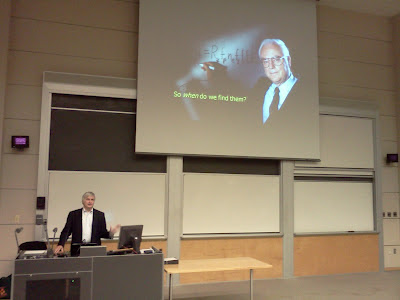First, we had Seth Shostak, who talked about the search for life on other planets (something I’ve written about a bit).
A few things particularly interested me. First, Shostak was surprisingly specific and optimistic about when he expected us to find life on other worlds. He bet everyone in the audience a cup of coffee that we would have confirmed the discovery of extra-terrestrial life in two dozen years. He spoke Monday, so mark your calendars for 23 September, 2036. I’ll take that action.
The other thing that struck me was that Shostak was pinning a lot of hope into Moore’s Law: the generalization that computer power is doubling every couple of years. He claimed that we would have computing power equal to a human brain by 2020, which meant that humans would have built our own replacements (!), and that we should be ready for any intelligence that we contact to be machine intelligence.
If you have a chance to hear Shostak speak, do not miss it. He is fantastic: on target, informed, and extremely funny. He is one of those people who has taken a sort of standard academic slide talk and ramped it near to the top of its form.
In the evening, we had Michio Kaku. And I had to admit, I was stunned to see this sort of line-up for a physicist. What you can’t see is how far this stretched; almost literally around the block.There wasn’t enough room, and so a few hundred people had to watch his presentation in an overflow theatre in another building.
I was less than impressed by Kaku’s presentation. He wasn’t speaking as a scientist; he was there to act as an oracle, telling us about all the wonderful things awaited us “in the future.” With his shock of white hair, Kaku certainly looks the part. Like Shostak, Kaku put a lot of emphasis on Moore’s Law. I got the impression Kaku talks to a lot of upper class business people with a lot of privilege, because the talk he gave would be very reassuring to such people.
Kaku was polished and funny and provocative, but it felt like he had given it so many times that it was canned. The responses to some of the question in particular seemed not to be made directly to what was asked, but felt more like, “This was related to this section of that other speech a I give, so I’ll pull up that and use that to answer the question.”
And for someone who had given as many talks as he obviously had, I was a bit stunned by the slides he used. He had stock PowerPoint templates, often with pretty crummy low-resolution graphics. Once an academic, I suppose...
He ended his talk by telling a story about Einstein and his chauffer... without letting us know it’s an untrue story.
Without further ado, here’s a Michio Kaku drinking game.
- When Kaku says, “We physicists...”, take a drink.
- When Kaku says, “In the future...”, take a drink.




No comments:
Post a Comment